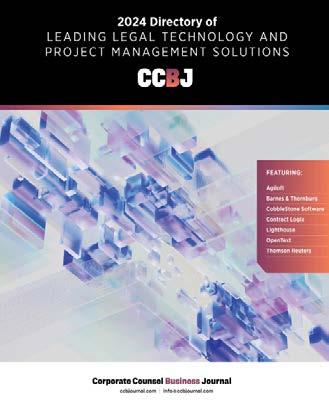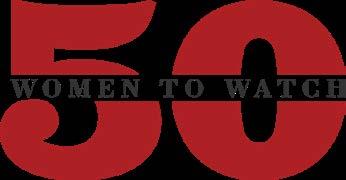Prioritize Cultural Fit
When Hiring
PERSIA STREED, CHIEF COMPLIANCE OFFICER, MTC WEALTH MANAGEMENT SHARES THE BEST ADVICE SHE'S RECIEVED; KNOWLEDGE IS POWER.

INSIDE
Prioritize Cultural Fit When Hiring
Law Firm Hiring Plummets
35 Percent Amid Layoffs, Slow Demand
New NY Law Restricts Employer Access to Social Media Accounts of Employees and Job Applicants
AND MORE!
Counsel Business Journal MARCH EDITION VOLUME 32, NUMBER 2
Corporate
B JANUARY • FEBRUARY 2021
In This Issue
The participants in the CCBJ Network demonstrate, through their many contributions, their unwavering commitment to the advancement and success of corporate law departments. The engagement and support of these “partners of corporate counsel” assure we continue to develop and distribute the news and information this unique and sophisticated audience relies on to meet the evolving legal and business needs of their organizations. CobbleStone
LAW BUSINESS MEDIA Kristin Calve EDITOR & PUBLISHER Jennifer Coniglio ASSOCIATE PUBLISHER & VP, EVENTS Neil Signore SVP & MANAGING DIRECTOR OF EVENTS Matthew Tortora SENIOR DATABASE MANAGER Lydia Boecke ADMINISTRATOR, EDITORIAL AND GRAPHIC DESIGN Katie Mills ACCOUNTING
MARCH EDITION VOLUME 32, NUMBER 2 AT THE TABLE 2 2 Prioritize Cultural Fit When Hiring Kristin Calve FRONT 7 7 Law Firm Hiring Plummets 35 Percent Amid Layoffs, Slow Demand 8 Required Reading PULSE 12 12 New NY Law Restricts Employer Access to Social Media Accounts of Employees and Job Applicants Jared Cook 17 Five Legal Marketing Trends for 2024 Chris Nelson LEGAL TECH SPOTLIGHT 19 19 Legal Tech Spotlight Series WeVorce CORPORATE COUNSEL BUSINESS JOURNAL 1 Agiloft American Arbitration Association Axiom Barnes & Thornburg Contract Logix Exterro Inc. McGuireWoods LLP Mitratech Thomson Reuters
Kristin Calve
Please help us improve and expand our services to corporate counsel by sharing your ideas with our publisher,
, at 203-722-1188 or kcalve@ccbjournal.com NETWORK Strategic Partners Advisors Contributors
Software Epiq OpenText Advologix Epona Everlaw iManage Legal Files Lighthouse OneTrust Onit Protiviti SimpleLegal SCCE Trellis UnitedLex

Prioritize Cultural Fit When Hiring
Persia Streed, Chief Compliance Officer of MTC Wealth Management shares the best advice she's recieved; Knowledge is power.
CCBJ: What led you to join MTC Wealth Management?
Persia Streed: MTC, and MTC Wealth Management as a whole, is an interesting organization. I was contemplating joining a much larger, classic, Wall Street firm, but what drew me to MTC was, even at first glance, seeing how their senior leadership was so diverse. Particularly in an industry like finance or financial services, there’s been a historic homogeneity when it comes to people in senior leadership roles. While we’ve come quite a long way from that, we still also have a long way to go. So given that, and having seen and then interacted with senior leadership and the recruitment process, it was clear that they placed a great deal of value and respect in having a diverse community of leaders. And that just really spoke to my heart.
Why don’t you tell us a little bit about your leadership style and who or what has influenced it?
It’s very collaborative. I think a part of that is because compliance is historically seen as a bit of a policing entity, and I just don’t view it that way.
I think it’s about aligning the best interests of the clients and the organization and the professionals at our organization. It’s about looking towards being compliant in a way that can facilitate collaboration and process; taking a sensible approach to fulfilling compliance obligations that takes into account the day-to-day realities of the different professionals involved, whether they are the financial advisors or the operations team. It’s about making sure that you set a realistic approach to things expected of them on top of their day-to-day duties.

Traditional fields of law are oversaturated because law grads don't know the opportunities available to them in niche areas.
Part of that was inspired by some great mentors that I’ve had. I’m very fortunate at present to have a really great board of directors. In particular, the chair of our audit committee has an extremely storied and impressive career in the financial services and legal sectors. Their insights and guidance have been invaluable, particularly seeing what
2 MARCH 2024 Kristin Calve At the Table
can be done to create more effective leadership rather than having to learn that completely on my own.
What’s the most influential career advice you’ve received from them or someone else?
The best career advice I have received is a very simple one that’s been drilled into me year after year: Knowledge is power. That was from my father, who was a professor and a big supporter of expanding one’s intellect and gaining as much insight through reading and experience. By doing so, you position yourself to have a more powerful impact in the world and on those around you. That’s still the best piece of advice I’ve ever received and that I regularly pass on to members of my team.
How would you describe the culture of your organization?
I’ve worked at small, startup hedge funds and big, publicly traded financial institutions. And I think we are in an interesting sweet spot because the firm itself has grown quite rapidly in the past 5 years and even having done so, the culture has remained very warm and quality-of-lifecentric. There’s a great deal of importance placed on the wellbeing of each employee.
We have a lot of wonderful initiatives around diversity. We also have great resources, from mental health awareness and support to physical health awareness, including frequent visits from local hospital personnel to do on-site blood pressure testing or a mammograms. These inititatives allow you to not feel like you have miss work to take care of yourself.
What qualities do you look for when you’re hiring new people for your team or just for the firm?
One of the lessons I’ve learned in this rapid growth mode is that there are things that can be taught— such as
advancing certain existing skills to better apply to the unique circumstances of our organization—and then there are things that really are challenging and maybe cannot be taught, like culture.
One of the biggest takeaways has been the understanding that most intelligent people can be taught the specifics of the different roles and tasks, but before you even get to that, you have to prioritize successful acclimation to the corporate culture, which involves their speaking to all the people they’ll be working with, understanding how to deal with different types of clients, showing a commitment to the ethics and values of the organization and giving one’s best to colleagues, clients and the organization. That mentality is more intrinsic; not a skill as much as it is part of your personality.
What changes would you like to see within the legal profession?
I’ve already touched on some today, such as greater emphasis on diversity and mental health. I also think the legal profession as a whole could do a better job of highlighting some of the more nuanced fields of law to those that are graduating from law schools. There’s a serious concern about the concentration of licensed attorneys and their filtering into traditional fields that are oversaturated. A lot of law grads don’t have comprehensive understanding of the opportunities available to them unless they happen to meet someone who practices a niche area of the law.
There are many different legal fields that one can develop expertise in early on, including special courses you can elect after your first year. If they’re not in the curriculum the ABA could play a role in showing the incredibly talented cass of graduates we see year after year some of the more fascinating, unheard of or less discussed areas of law. When I graduated law school, regulatory compliance,


A NEWSLETTER FOR EVERY PROFESSIONAL!

NOT A SUBSCRIBER?
SUBSCRIBE TODAY!
If you’re interested in sponsoring newsletters, banners or special sections, please email nsignore@ccbjournal.com
especially in financial services, was not treated like something you could do as a field. No one ever said to me that I could be a CCO, or conveyed to me that having a modicum of experience in compliance was sufficient. Now the bar is higher than just a law degree. I took every securities-related and federal agency-related course I could get my hands on, but no one ever brought to my attention the fact that financial services compliance is excellent in terms of job security, that it’s fascinating and has a real impact.
There are so many other types of legal specialties that never cross one’s mind when you’re in law school and thinking about big firms, corporate finance or litigation, torts and things like that. I think showing the full spectrum, different areas of application of legal accreditation—can do a lot for the industry and that having those skills applied pretty much everywhere would probably improve the general consumer environment as well.
Anything else you’d like to add?
Our firm is a big supporter of the Make-A-Wish Foundation and we’re all taking part in Tampa’s Walk/Run Marathon for that organization. I encourage anyone who’s reading this to take advantage of whatever charitable endeavors your firms and your organizations have. Sometimes they’re not emphasized as much as they should be. You can do a lot with the skillset you already have, such as teaching financial basics to seniors in high school. The same, certainly, could go for law or for anything or anyone who needs a mentor. There are a lot of great opportunities out there to contribute back.
CORPORATE COUNSEL BUSINESS JOURNAL 5




Front
Law Firm Hiring Plummets 35 Percent Amid Layoffs, Slow Demand
For many years, law firms counted on a steady pipeline of lateral hires to meet the demands of clients. Then, last year, the lateral goose stopped laying eggs. According to Bloomberg Law, hiring fell by more than a third for all lawyers and by almost 50 percent for associates. Citing the National Association for Law Placement(NALP), associate hires plunged by 43 percent, while partner moves declined by 10 percent. It was the second down year in a row in the wake of a “pandemic era surge,” as faltering demand forced some major firms to resort to layoffs and scale back recruiting, especially in corporate and transactional areas. “The last 3 years has taught firms some pretty hard lessons in regard to how to go about building up the associate ranks,” says Summer Eberhard, a California-based legal recruiter at Lateral Link. “They grew at an exponential rate in 2021 and, as work went down, they no longer needed the number of attorneys that they had.” Much of the decline was driven by corporate practices, according to legal recruiters. That’s typically the most active practice areas for hiring among firms. “There was a slight uptick in litigation, but that didn’t cover the vast number of corporate needs that usually keep recruiters busy,” said Ru Bhatt, a recruiter for Major, Lindsey & Africa in New York. Firms didn’t just cut back on lateral hiring last year. They’ve also trimmed the sizes of their summer classes, NALP found in a separate report released earlier this month. The data indicates firms expect continuing soft demand for another year or two. “It’s quite possible we’ll see more layoffs this year,” says Nikia Gray, NALP’s executive director. “At the very least, I expect we’ll see firms making quick termination decisions for any performance issues. There is only so long firms are willing to carry excess capacity.”
The overall total volume of lateral hiring declined by 35 percent compared in 2022 in the 479 offices/firms.
Lateral associate hiring accounted for 55 percent of all lateral hiring in 2023 (down from 64 percent in 2022).
Lateral partner hiring accounted for 24 percent (up from 18 percent in 2022).
The full report can be found at: www.nalp.org/perspectivesonrecruiting.
CORPORATE COUNSEL BUSINESS JOURNAL 7
Briefly
OpenText Strengthens X12 Collaboration to Accelerate the Future of Supply Chain B2B Data Exchange
Thomson Reuters FirstQuarter 2024 Earnings Announcement and Webcast Scheduled for May 2, 2024
OpenText to Showcase Power of AI to Supercharge Modern Work at AIIM24
Exterro and Privacy Ref Join Forces to Deliver Enhanced Data Privacy and Compliance Solutions
Thomson Reuters ONESOURCE solutions are now SAP Endorses Apps available on SAP Store
Epiq to Host Sustainability Webinar on Earth Day, April 22
CobbleStone Software Included in Spend Matters 2024 SolutionMap
Frank DeBorde & Lisa Wolgast Join Barnes & Thornburg's Finance Insolvency and Restructuring Department
CobbleStone Software Helps Wound Care Advantage Streamline Contract Management Processes
Axiom Introduces New Permanent Recruitment Solutions
Information Management
Experts Gather to Explore How AI Elevates Human Potential at OpenText World Europe 2024
Cobblestone Software
Releases New Video on Overlooked Secondary Functions of CLM Software
CobbleStone Software
Releases New Guide on Contract Management that Highlight the Future of CLM
Required Reading
Too busy to read it all? Try these books, blogs, webcasts, websites and other info resources curated by CCBJ especially for corporate counsel and legal ops professionals.
BLOG: Above the Law

In this piece from the indomitable Olga V. Mack, a Fellow at CodeX, the Stanford Center for Legal Informatics and a Generative AI Editor at law.MIT, the spotlight falls on a key principle that Ms. Mack says remains paramount: Use cases. “Use cases are not just theoretical constructs,” she writes. “They bridge technological, potential and practical utility. They articulate how technology can solve specific problems, streamline processes and enhance decision-making.” Mack digs deep into the importance and impact of use cases, which stand out because of the high stakes in legal, a “uniquely complex” domain. She lays out key steps for deliberately crafting good use cases, including diving into workflows, engaging with legal pros and prioritizing client-centric solutions. “As the legal profession continues to navigate the waters of digital transformation, the importance of use cases stands as a beacon guiding the journey,” she says. “They are the litmus test for the practical value of technology, ensuring that innovations not only dazzle with potential but also deliver tangible benefits. In the quest to integrate AI and legal technology into legal practice, use cases are not just important but indispensable.”
WEB: bloomberglaw.com
In this piece from Bloomberg, Roy Strom tries to spook Big Law with a Big 4 boogieman. “KPMG sees an opportunity to grow its legal business by outspending major law firms on artificial intelligence tools,” Strom writes. “The Big 4 consultancy plans to invest ‘tens of millions of dollars’ to help corporate law departments streamline operations, including implementing generative AI. Stuart Fuller, KPMG's head of legal services, says technology will disrupt the Big Law business model by snatching away routine tasks now handled by junior lawyers. “The most critical difference between a Big Law firm and the Big 4 is the ability to have capital provided by the organization to invest in your own business. Creating technology-enabled solutions and investing in AI takes capital. We’ve seen the very powerful business model of the law firm survive a whole range of things, says Fuller, adding that generative AI is different in that it goes to the core of what lawyers do: Language and words. “The transformational effect of it is significant.”
MAGAZINE: money.usnews


This piece asks a deceptively simple question: What are soft skills? The writer, Jennifer Ortiz, starts by identifying what they are not. “Hard skills are technical skills related to your job and industry and are usually learned through education and training,” she writes, noting they are used for specific tasks and can be demonstrated by certifications and degrees. “Interpersonal skills, such as communication, teamwork, leadership and negotiation skills, are considered soft skills, along with organization, creativity, adaptability, efficiency, persistence, critical thinking and time management. For more, see Ortiz’s piece at money.usnews.
BLOG: Ten Things
In the latest installment of the popular Ten Things blog, Sterling Miller presents something a little different – no embellishment, no snarky commentary, no cut off at 10 things. With that, here is a truncated version of Miller’s rules for in-house counsel: There is enough work to go 24/7/365, but you don’t have to; Say it and write it as simply as possible – get to the bottom line asap; It’s ok to say “I don’t know” – don’t bluff your client; Smile. Have a sense of humor; “To Do” lists are fine but realize your priorities will change hourly; Learn the business; It’s not what you say, it’s how you say it; Don’t be a jerk; Eat lunch; Everyone needs a break; Don’t let the boss be surprised; Be nice.

8 MARCH 2024
Contributors
Thanks to the law firms, technology companies, alternative legal service providers, management consultants and other supporters of corporate law departments who share their insights and expertise through the CCBJ network. Your participation is appreciated.

Jared Cook is a Senior Counsel in Tully Rinckey PLLC’s Rochester office, where he focuses his practice on federal and state labor and employment and commercial litigation. The bulk of Jared’s litigation experience is in employment law, handling both large class and collective actions and singleplaintiff cases. He has also expanded his practice beyond employment law and has developed experience representing construction firms and other commercial parties in contract disputes all over Western New York.

Chris Nelson is the Senior Manager of Vertical Marketing at CallRail. With more than 10 years of experience in B2B and B2B2C marketing of consumer durables, professional services, and SaaS, he leads CallRail's effots to grow in key industries, including Legal, Healthcare, and Home Services. A graduate of Syracuse University and the University of Kentucky College of Law, he practiced for 6 years in small and mid-sized firms before joining one of his clients as general counsel and head of HR.

Persia Streed oversees the compliance, risk, and audit programs of Members Trust Company (MTC) and also serves as the CCO of MTC's SEC-registered RIA, MTC Wealth Management. Her career began within General Counsel and later the Compliance department of Raymond James & Associates.
Persia recieved her BA in Interanational Studies, Conflict Resolution & Political Economy from Emory University. She earned her J.D. from University of Miami, School of Law. As of June 2024 she will sit on the Board of Governors. for the West Florida Chapter of IIA.

Epiq AI Expands Legal Solutions as Part of the Epiq Service Cloud
Thomson Reuters Anounces 2024 Investor Day!
Womens Day: How Exterro is Balancing DEI & Championing Women's Growth
Thomson Reuters to Present at Bank of America Securities 2024 Information Services Conference
AAA Anounces Updated Construction Industry Arbitration Rules
Chip Hancock, McGuireWoods Associate Joins VetEvolve
Agiloft Strengthens Connectivity of Data-First Agreement Platform with New Google Docs App and Custom API Creation Platform
Renee Meisel & Shelley Armitage Join UnitedLex
Thomson Reuters Successful Acquistion of Pagero Paves the Way of Significant Growth Opportunities
Cobblestone Software Shares Which Features Address In-Demand Legal Technology Trends
Garen Marshall Joins McGuireWoods Government Investigations Team
CORPORATE COUNSEL BUSINESS JOURNAL 9
SUBMIT YOUR ANNOUNCEMENTS TO editor@ccbjournal.com




DOWNLOAD NOW 9th Annual Directory of Leading Legal Technology and Project Management Solutions FEATURING: Agiloft Barnes & Thornburg CobbleStone Software Contract Logix Lighthouse OpenText Thomson Reuters
CORPORATE COUNSEL BUSINESS JOURNAL 11 11 JANUARY • FEBRUARY 2021

New NY Law Restricts Employer Access to Social Media Accounts of Employees and Job Applicants
JARED COOK TULLY RINCKEY LEGAL
CCBJ: Can you give us some background on the new Labor Law amendment relating to social media law?
Jared Cook: It was signed into law back in September of last year, so this is not terribly new, or a big surprise. The new law gave us some time to get ready for the change, which puts certain restrictions on employers’ ability to require employees to provide certain social media information.
What exactly is going to change for New York employers and employees on March 12, 2024?
What the law does is make it illegal for an employer to request, require or coerce any employee or applicant for employment
to disclose any username and password, password or other authentication information for accessing a personal account through an electronic communications device.
There are also some additional provisions. It’s going to be illegal for an employer to access the employee’s or applicant’s personal account, and to reproduce photographs, videos or other information contained within a personal account obtained by any means prohibited by the law.
Basically what that means is employers may not ask their employees or applicants to give them their social media login information or to get any photos, videos, or anything else from the employee’s or applicant’s account. The other thing they can’t do is require the employee to access that account in the presence of the employer. In other words, not only can they not demand somebody’s login information, they also can’t hand an employee or applicant a computer and say, “Okay, I’m not asking for your
12 MARCH 2024
Pulse
information, but I want you to log in and then show me your account.”
How are employees protected under this amendment to the NY Labor Law?
Before the change, employers could both request and require these things. If you were an employee and your employer said, “We’re going to start requiring you to give us this as part of your employment” or “we want to monitor your social media,” if you didn’t agree to that, they could terminate you.
Now if they terminate you because you refuse to provide this information, you may have a claim against them for violation of this law. So, the law now protects the employee from retaliation by the employer for not complying with an illegal demand.
Previously the employee’s only remedy was to quit and find a new job. Now they can tell their employer, “Hey, this is illegal. You can’t require me to give this to you.”
How should employers prepare for this new law?
Employers should review all their social media policies to make sure there’s nothing in there saying that all employees are required to give us their social media information. It’s not a terribly common policy, but you do see it from time to time. Employers may want to see what their employees are saying about them on social media, and one way to do that might be to tell employees, “Okay, part of working here is that you have to let us look at your X or Facebook feed, or whatever, so we can see what it is that you are saying about your workplace so we make sure that you’re not saying anything bad about us or anything that could damage our reputation.”
They can’t do that anymore. If an employee’s X feed is public, they can, of course, monitor it as any other member of the public. But they can’t require an employee to give them this information. So employers should review their policies to make sure that they’re not requiring employees to give this information to them. Even if they’re not actively going out and doing it, just having such a policy on paper that requires it could get you in trouble.
In reviewing your policies, you may not be sure whether something violates the law because this law says that you can’t do this for
what they call “personal accounts,” and then goes on to distinguish personal accounts from non-personal accounts. So if the account in question is not a personal social media account, but rather one created to promote the employer’s brand, the employer could inquire about that.
There may be cases where that line is a bit blurry. Maybe an employee created an account that started its life as a strictly personal account, but at some point, the employee started using it for business purposes and to promote the employer’s brand. Has it crossed the line and is no longer a personal account? Employers that don’t know if an account is subject to the new law should definitely speak with an employment attorney, who may provide clarification about the account as well as perform a general policy review.
What information from social media may employers continue to use? You mentioned non-personal accounts, but is there anything else?
Nothing in the law prevents an employer from requesting or requiring disclosure of access information to an account that was provided by the employer to be used for business purposes, and where the employee was given prior notice of the employer’s right to request or require that information.
In other words, if the employer said, “Hey, part of the way we do business here is we require everyone to have an X account where you actively promote our brand, and that’s part of your job responsibilities. In fact, we’ve already created an X account for you. Here’s the login information. Now go on and promote our brand.”
If that’s the situation, then the employer is permitted to require that information. So if the employee says, “Okay, thank you for my new business X account,” changes the password then starts using it, the employer is permitted to say, “Okay, we need you to give us the updated password.”
The other thing an employer is permitted to do is access information to an account that is known to the employer to be used for business purposes. So even if the employer didn’t provide that account to the employee, if it’s an account the employee uses for business purposes and it’s known by the employer that it’s being
CORPORATE COUNSEL BUSINESS JOURNAL 13
used in that way, then the employer can require the employee to provide access. So, if an employee uses his or her personal account to promote the employer’s brand, there’s a risk that the employee’s account could be found not to be a personal account protected by this law.
What constitutes using the account for business purposes? We’ll have to see how the courts interpret that. I could see an argument that it’s got to be more than de minimis. If I just mention once on my X feed that I work at Tully Rinckey, does that, by itself, make it an account used for business purposes? I would argue it probably doesn’t. But exactly where are you going to draw that line? How many mentions of your employer does it take before it becomes an account known to be used for business purposes? That is an issue that may need to be addressed, either through court decisions or additional regulations by the NY State Department of Labor.
What should employees do if they feel the law is not in compliance?
The first thing they should do is ask their employer, “Is this consistent with the law?” The employer may not know about it. It has been in the news, but not everybody follows these things obsessively the way employment lawyers might. So sometimes a situation like this could be addressed by simply making sure that the employer knows about the law. They may realize, “Hey, we’re not in compliance here.” So, an employee’s first step probably ought to be simply to ask his or her employer, “Hey, do you know about the new social media law? Are you sure that this request is in compliance?”
If the employer’s response is, “Yes, we know about the law, and yes, we’re in compliance,” and the employee believes otherwise, the next step would be for the employee to speak with an employment attorney to see if they’ll confirm the employee’s understanding or if they agree with the employer. Getting clarification may be all that’s required to resolve the issue.
If the employment attorney agrees with the employee that the employer is not in compliance, the next step is probably to file a complaint with the NY State Department of Labor because that’s probably how it’s going to be enforced. While the law does not appear to expressly create any kind of statutory cause of action for
an employee to sue an employer for violating the law, courts may infer that such a cause of action is implied by the law, and there are other provisions of the Labor Law that might provide at least some protection.
For example, there’s the New York State Private Sector Whistleblower Law, which prohibits an employer from taking retaliatory personnel action against employees because the employee made a complaint of employer violations. Under that law, if you disclose to your employer that they are breaking the social media protection law and they terminate or otherwise retaliate against you for that disclosure, you could plausibly have a claim.
However if the employer demands your social media passwords and you say, “No, that’s illegal,” and then they don’t take retaliatory action against you, you probably wouldn’t have a whistleblower suit, but even asking for the information is a violation of this new law. It’s an open question as to whether you would have some other kind of legal claim, but your next step at that point—after speaking to an employment attorney—would probably be to go to the Department of Labor and make sure that they know what’s going on. Maybe they will come in and order the employer to stop violating the law.
What can companies do about employees who refuse to disclose login credentials of non-personal social media accounts?
It will be the same as any other policy or rule that an employer requires. Their remedy would be to initiate disciplinary proceedings against the employee consistent with whatever disciplinary policies they have. They may have a policy that says, “We have a progressive discipline policy where we start with a verbal warning, then go to a written warning, then if you don’t correct your violation, you may be terminated.”
Employers should, of course, be careful that they’re complying with not only their own policies, but any employment contract they may have that requires some kind of progressive discipline, or any collective bargaining agreement they may have with a union which requires that sort of thing. But generally speaking, the employer’s remedy will be to impose disciplinary consequences, up to and including termination.
14 MARCH 2024

Even before this new law, employers could discipline and/or terminate their employees for failure to follow their policies. This law doesn’t change that. What it does is make it illegal to request certain information, and that may provide employees the basis for a possible retaliation claim if the employer retaliates against an employee who tells the employer that their request is illegal under the new law.
Anything else you’d like to add about this new social media law?
There are a couple of points that we haven’t covered yet. One thing is that the law includes certain exceptions. We talked about some of those exceptions, such as an account created by the employer and used for business purposes, or an account known by the employer to be used for business purposes.
But there are a couple other exceptions or exemptions; one is that it doesn’t prevent an employer from accessing an electronic communications device paid for by the employer where the provision of the device was conditioned on the employer’s right to access that device. In other words, if I go work for a company, they issue me a cell phone as part of my job, or if they pay for my phone, in whole or in part, but in return for that, they say “You have to allow us to access that device,” and I agree to that, then
the law does not prevent them from accessing that phone. While the law would probably prevent an employer from requiring an employee to sign an agreement that he or she is waiving their rights under this law, allowing the employer to obtain the employee’s login information, if the employer is paying for the phone, or part of the phone, then employer and employee can agree that the former may review and access the device whenever it needs to.
The other thing the law does is allow employers to access information they wouldn’t normally be allowed to access when necessary to comply with a subpoena, court order or other legal demand. So if an employer gets a court order requiring it to get this information from an employee, this new law isn’t going to prevent them from doing that.
The new law also doesn’t prohibit an employer from restricting access to certain websites on an employee’s work computer. So, if the employee logs into his or her work computer and the employer says, “Hold on. We don’t allow you to access certain websites while at work,” that’s not prohibited.
Also, the law doesn’t prohibit an employer from accessing information that’s available in the public domain. For example, if an employee’s X feed is not private, the employer can access that. It just can’t require the employee to his or her login information or access to the employee’s private account.
Lastly, this law doesn’t apply to any kind of law enforcement agency or fire department or corrections department. If you work for one of those entities, they can continue to request this information from you.

Jared Cook is a Senior Counsel in Tully Rinckey PLLC’s Rochester office, where he focuses his practice on federal and state labor and employment and commercial litigation. The bulk of Jared’s litigation experience is in employment law, handling both large class and collective actions and singleplaintiff cases. He has also expanded his practice beyond employment law and has developed experience representing construction firms and other commercial parties in contract disputes all over Western New York
CORPORATE COUNSEL BUSINESS JOURNAL 15

CCBJ’s Call for Nominations for the 2nd Annual 50 Women to Watch Is Now Closed!
Stay Tuned for Our 50 Winners!

SCAN HERE FOR THE LIST OF 2023 WINNERS
Five Legal Marketing Trends for 2024
CHRIS NELSON
CALLRAIL If the past year was a comedown for law firms from the craziness post-COVID, 2024 could prove to be just as challenging but in a different way. From economic headwinds and increased competition to artificial intelligence (AI) disruption, many are feeling pressured in ways that are very different than the past 15 years. However, in today’s hyper-competitive legal space, marketing remains just as vital for any law firm – from solo practices to those with hundreds of lawyers.
To better understand how law firms are dealing with current challenges and how they plan to attract more clients in 2024, CallRail surveyed nearly 2 dozen law firms. What emerged were 5 specific legal marketing trends that are anticipated to drive marketing tactics during the year ahead.
1. AI provides new opportunities to optimize marketing campaigns
First and foremost, AI has been and will continue to be a disruptor in the legal industry. That’s not necessarily a bad thing though, with law firms seeing an opportunity to use this emerging technology for assistance with marketing campaign optimization (52 percent), writing ad, website, or social media copy (48 percent), client intake (48 percent), and lead generation and qualification (38 percent). One respondent noted that “AI is going to allow firms to market easier with content creation and content ideas” while also helping with lead generation.
There’s also some downsides to AI too: generative AI tools like ChatGPT can make mistakes. These tools simply don’t always account for the legality and constitutionality of state codes and statutes, and there can be copyright and content duplication issues. As a result, it’s crucial the majority of law firms that are using AI-generated content thoroughly review and check the content for accuracy, originality and copyright issues.
2. Increased competition will be the biggest challenge for lead generation
As economic headwinds impact demand for legal services, law firms are experiencing increasing competition. In fact, out of all
the challenges impacting firms in 2024, increased competition for clients (62 percent) was ranked as the most significant. Economic headwinds (52 percent) and practice areas gaining or losing relevance (52 percent) were tied for second place.
However, less than one-third of law firms cited tighter marketing budgets as an issue (29 percent), which may be because increased competition for the same pool of clients makes marketing more necessary than ever. One respondent highlighted how “it’s been evident there’s more competition from attorneys not based in our market” with these regional firms developing a foothold in the local market primarily through Google local service ads, so their firm must also maintain Google local service ads.
3. Website and SEO is the best way to reach more leads in 2024
While increased competition means law firms must continue to get more savvy and strategic with their marketing, law firms indicate that website and SEO (81 percent) remains the tried and true channel that is still considered the best way to reach more leads in 2024. Digital marketing as a whole remains fundamental for law firms, with the top 5 tactics for lead generation including social media (76 percent), paid search (56 percent), email marketing (33 percent) and online review sites (33 percent).
One of the biggest benefits of using digital marketing tactics (and why they continue to be so crucial for law firms) is the ability to have more clarity on what’s working and what’s not. One respondent outlined how digital marketing “sheds light on where the marketing dollars are effective for the practice.”
4. Social media is the top marketing tactic firms want to test in 2024
Despite tighter marketing budgets, law firms are still open to testing new tactics in order to reach new leads, with social media emerging as the top choice, followed by AI, pay-per-click and SEO. While most law firms are already using social media for marketing purposes, they're more likely to become more strategic and consistent in how they use it. For those who are not already using social media,
CORPORATE COUNSEL BUSINESS JOURNAL 17

they’re more likely than ever to be joining the trend this year.
As law firms experiment though, being able to track the return on investment remains just as important. Getting these types of insights on new tactics is crucial for law firms who want to be as efficient and effective as possible with their marketing dollars – and want to know what experimental tactics are worth continuing to invest in.
5. Ethical standards and short sales cycles make legal marketing uniquely challenging
One of the biggest challenges that makes legal marketing unique compared to other industries, according to respondents, is the ethical standards that firms must uphold when advertising. Additionally, their leads are very intent-driven, which leads to shorter sales cycles than in most industries.
For instance, unlike most other industries, 1 respondent explained that their firm was limited in how they could
market by their State Bar Association and that they were required to “abide by ethical standards in advertising.”
Ultimately, marketing will always be under scrutiny because it’s non-billable and return on investment can be difficult to prove without the right tools. However, with the challenges that lay ahead, the findings highlight the important role that marketing will play in helping law firms optimize their lead generation –ultimately driving better bottom line numbers for firms.

18 MARCH 2024
Chris Nelson is the Senior Manager of Vertical Marketing at CallRail. With more than 10 years of experience in B2B and B2B2C marketing of consumer durables, professional services, and SaaS, he leads CallRail's effots to grow in key industries, including Legal, Healthcare, and Home Services. A graduate of Syracuse University and the University of Kentucky College of Law, he practiced for 6 years in small and mid-sized firms before joining one of his clients as general counsel and head of HR.

LEGAL TECH STARTUP SPOTLIGHT
CEO: Michelle Crosby JD
HQ: Boise, Idaho
# of Employees: 9
Total Raised: $8.31M
Post Valuation: $29.00M
Institutional Investors:
• Alex Felix
• Big Basin Partners
• BoomStartup
@wevorce
www.wevorce.com
Description:
Provider of divorce handling services intended to help couples and families get through their divorce. The company's services include assisting couples through the six board steps of divorce planning, co-parenting planning, financial agreements and divorce settlement, enabling clients to have access to lawyers, counselors and financial professionals when they need it throughout the divorce process.
Most Recent Financing Status
Hydrazine Capital, Signature Capital, BoomStartup and Venture Angels sold their stake in the company to an undisclosed buyer on February 18, 2019.

Source: Pitchbook (As of Sep 2023)
TO NOMINATE A STARTUP TO BE FEATURED, EMAIL
KCALVE@CCBJOURNAL.COM
MEDIAN 25.0x SIZE MULTIPLE
Are You a Legal Operations Professional?
Be sure to follow InHouseOps.com and subscribe to the Newsletter for updates and posts from key industry leaders!
Suggestions or submissions can be sent to our editors at Info@Inhouseops.com.
In-House Ops is published by Law Business Media, publishers of Corporate Counsel Business Journal.
Subscribe Today!

































